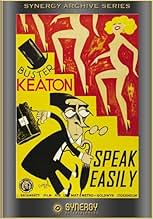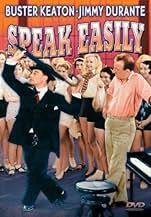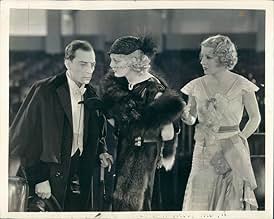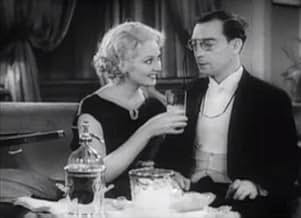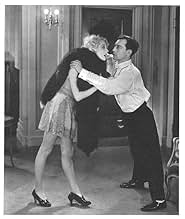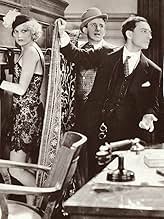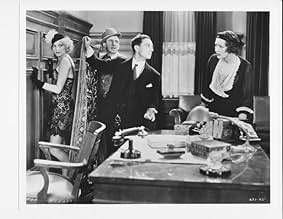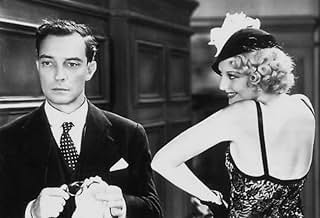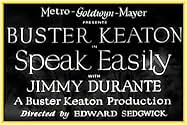AVALIAÇÃO DA IMDb
5,8/10
1,2 mil
SUA AVALIAÇÃO
Adicionar um enredo no seu idiomaA timid professor inherits a large sum of money and decides to fund a terrible musical.A timid professor inherits a large sum of money and decides to fund a terrible musical.A timid professor inherits a large sum of money and decides to fund a terrible musical.
- Direção
- Roteirista
- Artistas
Loretta Andrews
- Chorus Girl
- (não creditado)
Oscar Apfel
- Lawyer's Representative
- (não creditado)
Reginald Barlow
- Billington
- (não creditado)
Jack Baxley
- Tom - Sheriff's Deputy
- (não creditado)
Sidney Bracey
- Jenkins
- (não creditado)
Jim Farley
- Station Agent
- (não creditado)
DeWitt Jennings
- Sheriff of Lincoln County
- (não creditado)
Fred Kelsey
- Process Server
- (não creditado)
Avaliações em destaque
Keaton fans, you will not "die a thousand deaths" if you view this. Nothing Keaton does is bad, if for nothing else then for his presence. That being said, Buster was a silent start who was best when doing stuff created by his own mind. By 1932, the silent era was dead and the studios owned the movies. That Buster Keaton of "Seven Chances" and "Steamboat Bill Jr." was no more. That could never be recreated.
Times changed, films changed, and Buster adapted. Better this Buster than no Buster.
The story is funny, and there is some amusing slapstick. Buster plays his role well, adds some Buster to it, and is believable as a clueless college professor. Jimmy Durante is larger than life, in a hammy sort of way, but it's a good contrast with Keaton if anything. The movie works, and the closing scenes the show on Broadway is madcap with a modicum of brilliance.
We can ask what if. What if the silent era had never ended? What if Keaton and Arbuckle had not been separated so suddenly? What if the studios had taken over the industry with their formulae? Look, this is a pretty good film. It's not Keaton being tragically reduced to nothing. (Such was never possible! The great ones always adapt.) The tragedy is what happened to Roscoe Arbuckle. What happened to Buster? He hung in there and made people laugh.
Times changed, films changed, and Buster adapted. Better this Buster than no Buster.
The story is funny, and there is some amusing slapstick. Buster plays his role well, adds some Buster to it, and is believable as a clueless college professor. Jimmy Durante is larger than life, in a hammy sort of way, but it's a good contrast with Keaton if anything. The movie works, and the closing scenes the show on Broadway is madcap with a modicum of brilliance.
We can ask what if. What if the silent era had never ended? What if Keaton and Arbuckle had not been separated so suddenly? What if the studios had taken over the industry with their formulae? Look, this is a pretty good film. It's not Keaton being tragically reduced to nothing. (Such was never possible! The great ones always adapt.) The tragedy is what happened to Roscoe Arbuckle. What happened to Buster? He hung in there and made people laugh.
There have been a lot of very perceptive comments made by previous reviewers and I don't have much to add.
I have to agree with those who said it was a rather flat comedy with flashes of wit and charm.
Keaton gives an interesting performance as Professor Post. It seems a bit of a parody on Harold Lloyd, but also a precursor to Danny Kay's professor character. The movie is wise when it centers itself around him, but it seems that the scriptwriter wrote it for Keaton to improvise wildly, only to find Keaton sticking to the script. I imagine there was some tension between him and the director, with Keaton simply giving in and following the director's orders.
Thelma Todd stands out. She lights up the screen and exudes a knowing sophistication that only a few other actresses (Jean Harlow, Mae West and Katherine Hepburn) reached.
Again, I don't think that anybody but Buster Keaton fans will enjoy the movie and only Buster Keaton fans will have a few laughs out of it.
I have to agree with those who said it was a rather flat comedy with flashes of wit and charm.
Keaton gives an interesting performance as Professor Post. It seems a bit of a parody on Harold Lloyd, but also a precursor to Danny Kay's professor character. The movie is wise when it centers itself around him, but it seems that the scriptwriter wrote it for Keaton to improvise wildly, only to find Keaton sticking to the script. I imagine there was some tension between him and the director, with Keaton simply giving in and following the director's orders.
Thelma Todd stands out. She lights up the screen and exudes a knowing sophistication that only a few other actresses (Jean Harlow, Mae West and Katherine Hepburn) reached.
Again, I don't think that anybody but Buster Keaton fans will enjoy the movie and only Buster Keaton fans will have a few laughs out of it.
Not laugh out loud funny, by still mildly amusing and lighthearted tale of an introverted professor whose supposedly inherited a fortune and decides to bankroll an inept broadway play until his fortune attracts the attention of a tenacious gold-digger (Todd).
Keaton's antics are subdued here appearing as the straight man to Durante's comic antics, whilst there's ample support from future 'Charlie Chan' Toler as the besieged stage director, and vivacious Thelma Todd as the would-be wife who sees an opportunity to secure acting fame and fortune via the cashed-up Keaton. Their drunken apartment liaison is probably the film's highlight, elsewhere proceedings sometimes become tedious and trivial despite a straightforward plot.
Mild romantic comedy doesn't become too ambitious, playing the formula sufficiently well to entertain despite some occasional pacing problems, 6/10.
Keaton's antics are subdued here appearing as the straight man to Durante's comic antics, whilst there's ample support from future 'Charlie Chan' Toler as the besieged stage director, and vivacious Thelma Todd as the would-be wife who sees an opportunity to secure acting fame and fortune via the cashed-up Keaton. Their drunken apartment liaison is probably the film's highlight, elsewhere proceedings sometimes become tedious and trivial despite a straightforward plot.
Mild romantic comedy doesn't become too ambitious, playing the formula sufficiently well to entertain despite some occasional pacing problems, 6/10.
This film really, really depressed me. Not only was it completely unfunny, it did absolutely nothing with it's star Buster Keaton. It was odd to hear his voice, but even stranger to see him not do any of the routine that he's so famous for. Thelma Todd is also dreadfully waisted. She's beautiful, as always, but that's the film's only redeeming quality. And the story was atrocious. I've never seen a film so padded (well, maybe Blue Crush). This one should only be seen so people will see how hard the advent of sound struck film history. If it had come thirty years later, after more work and evolution, films like Speak Easily might never have been made.
Thelma Todd brings burlesque to a script replete with gags, some of them funny, as when Keaton carries her folded up looking like a filled bag. Pre-Code license pervades and Todd takes this to new realms. The Broadway show as conceived is quite brilliant with snow flakes, costumes, sets, dancers, music, balloons and genuine art, for a few moments, before Keaton tears it all apart. The Producers, Night at the Opera, owe somewhat. You don't get such a steady stream of sight gags and stunts, as with the trains, unless it's Keaton. Not many big laughs, but surprising in its disregard for conventions of good taste audiences might expect to see lived up at an MGM movie. Hedda Hopper does a great job as the tasteful Mrs. Peets.
Você sabia?
- CuriosidadesSecond of three films in MGM's pairing of Buster Keaton and Jimmy Durante as a comedy team. The other pictures were Salve-se Quem Puder! (1932) and Entre Secos e Molhados (1933).
- Erros de gravaçãoWhile Professor Post (Buster Keaton) is dragged by the train, clutching his luggage, his hat flies off and he is unable to grab it. In the next shot, his hat is once again firmly on his head.
- Citações
Eleanor Espere: Tell me, Timmy. Have you ever seriously thought of marriage?
Professor Post: Yes... that's why I'm single.
- ConexõesFeatured in Era uma Vez em Hollywood (1974)
- Trilhas sonorasGood Times Are Here Again
(1932) (uncredited)
Music by David Snell and Charles Maxwell
Lyrics by Samuel Marx
In the score during the opening credits and at the end
Played on piano by Jimmy Durante and sung by the chorus at the opera house
Played often in the score
Principais escolhas
Faça login para avaliar e ver a lista de recomendações personalizadas
Detalhes
- Data de lançamento
- País de origem
- Idioma
- Também conhecido como
- Speak Easily
- Locações de filme
- Chatsworth Depot, Chatsworth, Califórnia, EUA(train station)
- Empresa de produção
- Consulte mais créditos da empresa na IMDbPro
- Tempo de duração
- 1 h 22 min(82 min)
- Cor
- Proporção
- 1.37 : 1
Contribua para esta página
Sugerir uma alteração ou adicionar conteúdo ausente

